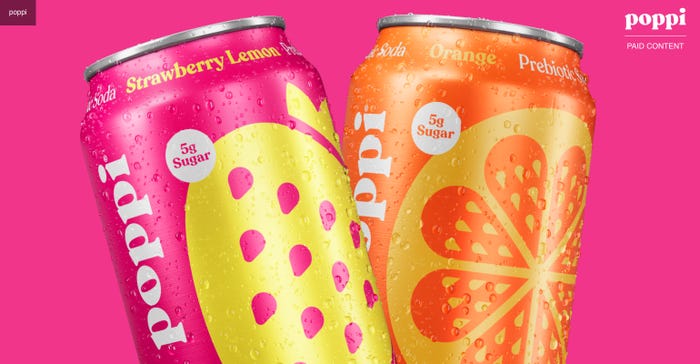Herbal supplement sales grow, led by CBD, turmericHerbal supplement sales grow, led by CBD, turmeric
Key findings of a recent market report included curcumin’s strong performance in both mainstream and natural channels, a strong increase in direct sales of herbal supplements, and cannabidiol’s (CBD) position among the 40 top-selling herbal supplements in the U.S. natural channel.
September 18, 2018

Retail sales of herbal dietary supplements in the United States experienced its strongest growth in 15 years, according to a new report from the American Botanical Council’s (ABC) HerbalGram. The category exceeded $8 billion in 2017, representing an increase of 8.5 percent compared to 2016. Other key findings in the report included curcumin’s strong performance in both mainstream and natural channels, a strong increase in direct sales of herbal supplements, and cannabidiol’s (CBD) position among the 40 top-selling herbal supplements in the U.S. natural channel.
The report relied on data from Nutrition Business Journal (NBJ), as well as data developed via a collaboration between market research firms SPINS and IRI.
Both SPINS/IRI and NBJ data pointed to increased sales in the mainstream channel. NBJ’s mass-market retail channel sales totaled an estimated $1.45 billion in 2017 (an 8.4 percent increase compared to 2016), compared to a total of $925.93 million for mainstream multi-outlet retail sales of herbal dietary supplements (a 0.69 percent increase compared to 2016), as indicated by IRI/SPINS data. Unlike IRI/SPINS, NBJ’s mass-market channel analysis includes convenience stores.
In the natural channel, NBJ indicated herbal supplement sales achieved $2.62 billion in 2017 (a 4.7 percent increase), while IRI/SPINS data indicated sales of $405.15 million (an 8.9 percent increase). NBJ analysis of the natural channel includes estimated sales from Whole Foods Market, which are not included in IRI/SPINS data.
Strongest sales growth, however, was attributed to direct sales of herbal supplements, which totaled $4.012 billion in 2017, an 11.2 percent increase compared to 2016, according to NBJ.
CBD makes an appearance
CBD appeared on the herbal supplement map for the first time in 2017, according to ABC’s report. In the natural channel, CBD ranked No. 12 among the top-selling herbal supplement ingredients. Sales of CBD ingredients reached $7.58 million in 2017, representing impressive 303 percent growth compared to 2016.
Products positioned for non-specific health conditions achieved highest sales, though SPINS noted condition-specific CBD formulations, such as those for mood support and pain/inflammation, are emerging.
CBD has been a source of regulatory contention in the dietary supplement industry in recent years. Despite FDA’s stance on CBD, which explicitly states the compound is not permissible as a dietary ingredient, products marketed as supplements and containing CBD continue to gain popularity in the market. At the “CBD and Hemp Extracts: How Do We Move Forward?” workshop on Wednesday, Nov. 7 at SupplySide West in Las Vegas, Nevada, leading hemp executives and attorneys will review the current landscape for CBD and strategies to mature as an industry and overcome hurdles to growth.
Turmeric as a top performer
Among top-selling ingredients is turmeric, which demonstrated strong performance in both natural and mainstream channels.
In the natural channel, turmeric marked the top-selling herbal supplement ingredient for the fifth consecutive year with sales of $50.35 million in 2017, an increase of 12.2 percent compared with 2016. Products targeting pain/inflammation represented the highest sales in the natural channel, followed by products for non-specific health conditions, joint health and cardiovascular health.
In the mainstream channel, turmeric claimed the strongest sales growth of herbal supplements, with sales of $32.45 million in 2017, a 46.7 percent increase from 2016. Turmeric jumped from the 10th top-selling ingredient in the mainstream channel in 2016 to fifth in 2017.
ABC’s report suggested increased awareness of Ayurveda among mainstream consumers, along with “viral popularity” of wellness tonics such as golden milk and turmeric-infused beverages, as potential contributors of growth.
Turmeric products positioned for non-specific health conditions were top sellers in the mainstream channel, though mainstream consumers are also buying products for joint health, immune health, and pain and inflammation.
Other key findings
ABC’s report indicated other key ingredient developments, including sales growth of more than 200 percent for nigella (Nigella sativa, Ranunculaceae) in the natural channel, and double-digit declines of various botanicals in the mainstream channel. Coconut oil saw double-digit declines in both mainstream and natural channels.
Nigella, also known as black cumin or black seed, saw an increase in sales in 2017 of 202.5 percent compared with 2016, making it the 23rd top-selling herb in the natural channel. SPINS data showed liquid seed oil preparations with non-specific health focuses made up the majority of nigella supplement sales in both natural and mainstream retail stores in 2017. ABC’s report cited only one other ingredient in the natural channel with more than 30 percent growth—moringa (Moringa oleifera, Moringaceae), which was sold mostly in powdered form, according to SPINS.
ABC’s report suggested increasing prevalence of “pill fatigue” could be driving demand for ingredients offered in alternate delivery forms, such as powders and liquids and, therefore, could be a factor driving growth of moringa and nigella.
In the mainstream channel, supplements with notable sales increases in 2017 included wheatgrass and barley grass supplements (44.2 percent), elderberry (34.7 percent), ivy leaf (30.2 percent) and fenugreek (33.5 percent) compared with 2016.
Complementing ABC’s analysis of the impact of delivery methods in the supplements market is a recent market study by Transparency Market Research, which predicted strong growth of the liquid nutraceuticals segment in coming years. The study, which reported the U.S. market for nutraceuticals will reach $102.6 billion by 2024, compared to $64.8 billion in 2015, also pointed to the rising level of competition in the supplements market to drive growth.
“The rising number of collaborations and mergers and acquisitions is projected to enhance the competitive environment of the overall market in the next few years,” the report noted. “In addition to this, the expansion of the product portfolio is one of the major factors that is projected to accelerate the growth of the growth of the U.S. market for nutraceuticals.”
ABC’s report noted three herbal supplement ingredients in the 2017 mainstream channel experienced sales decreases of more than 30 percent, including green coffee (–38.2 percent), coconut oil (–34.9 percent) and green tea (–30.4 percent). Coconut oil was the only ingredient in the 2017 natural channel with a significant decline in sales (–23.5 percent).
 This piece originally appeared on Natural Products Insider, a New Hope Network sister website. Visit the site for more news and insight on supplements and regulatory issues.
This piece originally appeared on Natural Products Insider, a New Hope Network sister website. Visit the site for more news and insight on supplements and regulatory issues.
About the Author
You May Also Like



.png?width=700&auto=webp&quality=80&disable=upscale)

